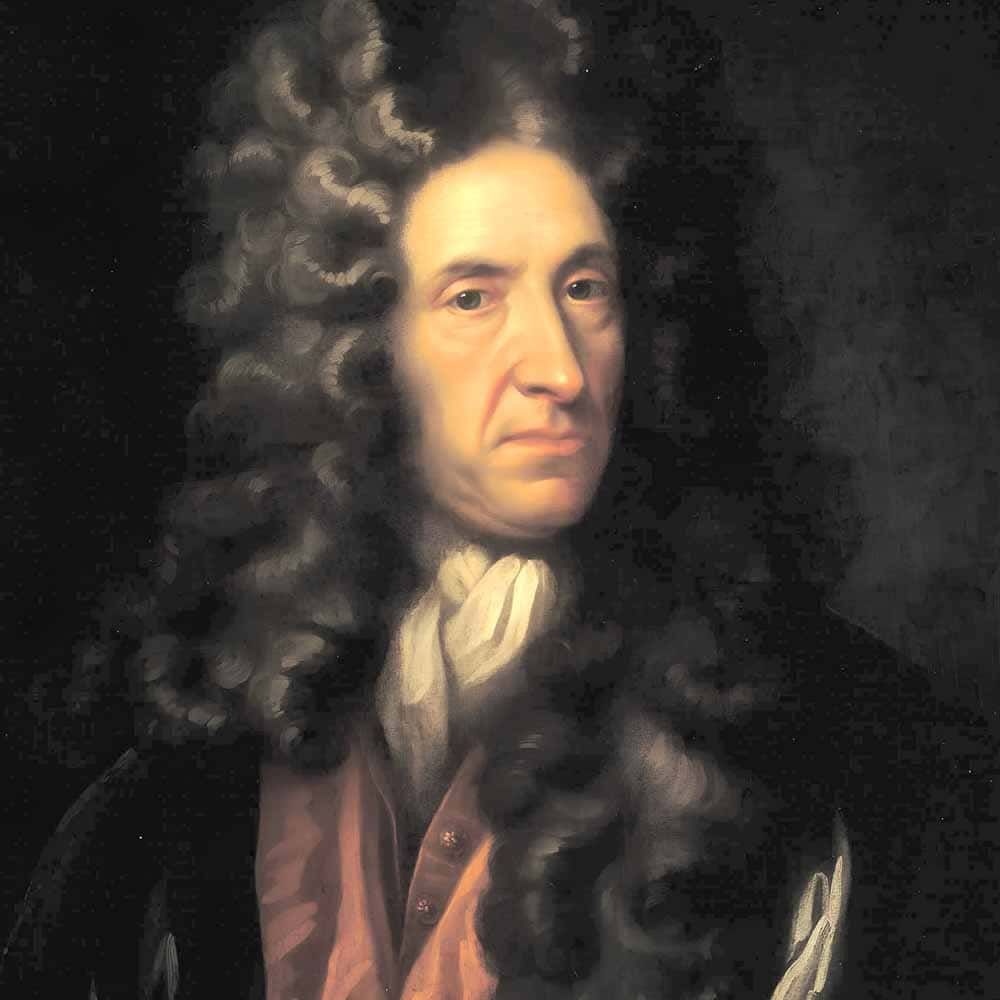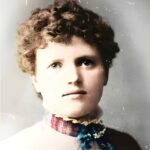
Daniel Defoe: Life and Legacy of a Literary Pioneer
Born: Around 1660
Died: 24 April 1731
Country: England
Notable Works: Robinson Crusoe, Moll Flanders, A Journal of the Plague Year, Roxana
Daniel Defoe stands as a seminal figure in the development of the English novel. Born around 1660 in London, he was an English trader, writer, journalist, pamphleteer, and spy, now most famous for his novel Robinson Crusoe, which is second only to the Bible in its number of translations. Defoe’s life spanned a complex time in English history, and he engaged deeply with its politics, economics, and social issues through his versatile literary outputs.
With a keen eye for detail and a knack for narrative, Defoe produced works that transcended mere storytelling to reflect the dynamics of his environment. He wrote on a wide array of topics, from economics to religion, and his novels often tackled contemporary issues through the lens of fiction. Defoe’s style of writing was innovative for the time, and his works left an indelible mark on the form and direction of the English novel.
Defoe’s prolific writing career encompassed not just novels but also more than 300 pamphlets, essays, and journals. His other notable works include Moll Flanders, A Journal of the Plague Year, and Captain Singleton. These writings not only provide insights into the life and mind of Defoe but also offer a rich commentary on society during the turn of the 18th century. His realistic portrayal of characters, attention to detail, and the introspective nature of his narratives make Defoe a key figure in the evolution of literature.
1. Early Life and Education
Daniel Defoe, originally named Daniel Foe, was born in London around 1660, the son of James Foe, a butcher of Flemish descent. In his adulthood, he modified his surname to Defoe, a change often speculated to reflect a desire for a more genteel or distinguished image. His formative years were imbued with a strong interest in literature and politics, prefiguring his later diverse career as a writer and merchant.
1.1. Formative Years
Defoe was born to James Foe, a butcher of Flemish descent, and his wife, Alice. Few details are known about his mother. The Foe family were Protestant Dissenters, which influenced Defoe’s upbringing and education significantly. Rather than following in his father’s trade, Defoe was steered towards a more scholarly path. His parents nurtured his intellect, intending for him to enter the ministry, which reflected their religious values and commitment to education.
1.2. Newington Green Academy
Defoe’s education at Newington Green, under Charles Morton, a proponent of modern and rational education, was crucial in molding his intellectual capabilities. The academy was known for its progressive approach to learning and Morton’s liberal educational philosophy greatly influenced Defoe. The curriculum was extensive, covering subjects from classical studies to contemporary science, providing Defoe with a broad knowledge base. This education not only prepared him for potential clerical duties but also laid the groundwork for his future endeavors in writing and commerce.
2. Literary Career
Daniel Defoe’s literary career was marked by a prolific output across various genres, including novels, pamphlets, journalism, and political works. His writings not only reflect the issues and sensibilities of his time but also display a mastery of the English language and narrative technique.
2.1. Novels
- Robinson Crusoe (1719): Often credited as one of the earliest examples of the English novel, it tells the story of a castaway’s survival and adventures on a deserted island.
- Moll Flanders (1722): This novel presents a picaresque journey of a woman who, born in prison, navigates through life’s adversities to ultimately seek redemption.
- Roxana (1724): Exploring themes of identity and societal expectations, the novel follows the fortunes of a fallen woman who strives to elevate her status through various relationships.
2.2. Pamphlets and Journalism
- Pamphleteer: Defoe proved to be a deft pamphleteer, utilizing the format to comment on the socio-political issues of the day. Defoe’s political pamphlets were prominent platforms for his ideological stances, reaching a broad audience.
- Periodicals: He contributed to the growth of journalism and the periodical press with writings that were characterized by their clarity and wit.
- An Essay Upon Projects (1697): This work laid out proposals for social and economic improvements, demonstrating Defoe’s forward-thinking approach.
- The Review: Launched in 1704, this publication stands out as his significant contribution to the development of modern journalism. Through his politicized commentary in “The Review,” Defoe engaged with the political landscape, influencing public opinion and discourse.
3. Major Works and Novels
Daniel Defoe’s literary contributions are marked by pioneering novels that blend fiction with realism. His most celebrated works include tales of adventure, reflections on society, and insightful journals.
Robinson Crusoe
Robinson Crusoe (1719) is a fictional autobiography of the title character, a castaway who spends 28 years on a remote tropical island. Defoe’s novel is considered one of the earliest examples of realistic fiction and is notable for its detailed depiction of Crusoe’s survival skills and inventiveness.
- Genre: Fiction, Adventure
- Follow-up Work: The Farther Adventures of Robinson Crusoe
Moll Flanders
Published in 1722, Moll Flanders is a novel chronicling the life of its protagonist, from her birth in Newgate Prison to her later years. This work delves into themes of repentance and reflects on the social dynamics of 18th-century England.
- Full Title: The Fortunes and Misfortunes of the Famous Moll Flanders
- Features: Journal-style writing, memoirs
A Journal of the Plague Year
A Journal of the Plague Year recounts the outbreak of the bubonic plague in London in 1665. Although presented as a journal, it straddles the line between fiction and a historical account, providing a vivid and harrowing portrayal of the city during a time of crisis.
- Intersection: Fiction, Journal
- Perspective: First-person narration styled as an eyewitness account
4. Daniel Defoe’s Political Involvement
Daniel Defoe, a figure deeply rooted in the political landscape of early 18th-century Britain, skillfully used his writing to navigate and influence the era’s political discourse. Although often associated with the Tory party later in his career, Defoe’s political leanings and activities were complex and multifaceted, reflecting the volatile nature of the period.
4.1. Pamphleteering and Politics
Initially, Defoe’s political stance was more aligned with the Tories, particularly evident in his early writings. His involvement in politics intensified with the Glorious Revolution and the reign of William III. His 1701 poem “The True-Born Englishman” was a satirical piece defending King William III against xenophobic sentiments in England, rather than a clear endorsement of Tory ideology. Defoe’s pamphleteering, marked by its wit and sharp commentary, often tackled various issues, including the union between England and Scotland.
- Key Works:
- The True-Born Englishman
- Legion’s Memorial (1701)
- The Shortest-Way with the Dissenters (1702)
4.2. Affiliation with the Tories
Defoe’s relationship with the Tory party became more pronounced through his association with Robert Harley, a prominent Tory statesman. After being imprisoned for “The Shortest-Way with the Dissenters” — a satirical work mistakenly taken as a serious criticism of Dissenters — Defoe was employed by Harley as a political spy and writer. This period saw Defoe’s involvement in promoting Harley’s political agenda, although his own political convictions often transcended party lines. During Queen Anne’s reign, while he appeared to support Tory causes, Defoe’s writings suggest a nuanced and pragmatic approach to political issues, including the Anglo-Scottish Union and the Anglican Church’s role.
- Noteworthy Associations:
- Aligns with Tories under the patronage of Robert Harley
- Spies for the Tory government
- Advocates for the Anglo-Scottish Union
Defoe’s political life was a balancing act reflective of the changing political and social dynamics of his time. His contribution as a pamphleteer and political participant offers a valuable insight into the complexities of early 18th-century British politics.
5. Controversies and Legal Issues
Daniel Defoe’s life was as dramatic as his novels, with his journey marked by controversy, legal troubles, and financial woes. These tribulations not only impacted his literary output but also shaped his perspective on society and politics.
5.1. Trials and Imprisonment
One of Defoe’s most significant legal issues occurred in 1703 due to his pamphlet “The Shortest-Way with the Dissenters.” Intended as satire, it proposed extreme measures against Dissenters, but was misunderstood as a serious advocacy, causing a public uproar. Defoe was arrested for seditious libel and sentenced to a humiliating stint in the pillory, followed by imprisonment in Newgate Prison. However, the public reaction was unexpectedly sympathetic, and Defoe was showered with flowers and drinks during his pillorying. This period also saw the composition of “Hymn to the Pillory,” which turned public opinion in his favor.
Imprisonment Details:
- Location: Newgate Prison
- Duration: Defoe spent several months in 1703 imprisoned.
5.2. Bankruptcy and Debt
Defoe’s financial life was fraught with instability. In 1692, he faced bankruptcy, with debts amounting to over £17,000, a significant sum at the time. This financial collapse, largely due to failed business ventures in commodities like wine and wool, led to the seizure of his assets and persistent debt issues that plagued him for years. Despite these setbacks, Defoe used his experiences as fodder for his writings, often weaving economic themes into his works.
Financial Struggles:
- Debt Amount: £17,000+
- Bankruptcy Year: 1692
- Consequence: Asset seizure and persistent financial troubles
Defoe’s experiences with controversy and the legal system profoundly influenced his writing, infusing it with a realism and depth born of personal hardship. These experiences, coupled with his literary talent, solidified his status as a pioneering figure in the development of the English novel.
6. Later Years and Legacy
Daniel Defoe’s final years were characterized by ongoing literary production and the establishment of his legacy in English literature. Despite facing financial difficulties, he remained a prominent figure in the literary world until his death.
6.1. Final Works
Defoe’s literary output in his later years continued to be substantial. One of his notable later works is The Fortunate Mistress (1724), also known as Roxana. This novel, along with others from this period, solidified his status as a pioneer of the English novel. His writing consistently engaged with social issues, human nature, and the complexities of the contemporary world.
6.2. Death and Impact
Defoe passed away on April 24, 1731. His death marked the end of an era, but his influence on English literature has endured. Recognized as a foundational figure in the development of the English novel, his works are continually studied and valued for their narrative style and social, economic, and political insights. His “Appeal to Honour and Justice” is a notable example of his efforts to defend his political actions and advocate for reform.
7. Cultural and Historical Context
Defoe’s life and work were deeply connected to the context of early 18th-century England, a period marked by significant changes, including wars, political shifts, and the evolution of the novel.
7.1. 18th Century England
England in the 18th century was experiencing major transformations. The events of the late 17th century, like the Great Plague and the Great Fire of London, influenced Defoe’s work, particularly in his historical writings like A Journal of the Plague Year. The political climate, characterized by Tory and Whig tensions, and religious issues such as Occasional Conformity, were frequent themes in his works. Defoe, raised in a Dissenter family, often reflected on these religious and political issues.
The period’s numerous wars, including those with France and internal Scottish conflicts, impacted trade and national stability, themes Defoe explored in his novels.
7.2. Literary Influence
Defoe’s literary contributions significantly shaped the English novel. His use of detailed realism and incorporation of contemporary societal issues made his works resonate with readers. Robinson Crusoe is a prime example of his innovative storytelling and use of realistic settings and events.
- Setting: Defoe often used London and other real locations as backdrops in his novels, reflecting his deep understanding of these settings.
- Impact: His works were widely read, including in neighboring countries, for their commentary on sociopolitical issues.
- Realism: Defoe’s realistic approach and integration of contemporary issues such as trade and warfare made his work pioneering in the novel genre.
Defoe’s role in shaping the narrative structure and content of the novel was significant, making him a key figure in the history of English literature. His ability to intertwine cultural and historical contexts with storytelling marked a major evolution in literary technique.
8. Themes and Styles in Defoe’s Writing
Daniel Defoe’s literary works are renowned for their diverse themes and groundbreaking narrative styles. He masterfully combined elements of adventure with a realism that was novel for his time, accompanied by incisive social commentary.
8.1. Adventure and Realism
Defoe played a significant role in the early development of the novel, skillfully weaving together adventure and realism. His narratives often include detailed descriptions of journeys, as seen in “Robinson Crusoe,” which provide a strong sense of authenticity and believability. This novel, in particular, is acclaimed for its realistic portrayal of a mariner’s survival on a deserted island. Defoe’s attention to the practicalities and realities of life adds a pragmatic dimension to his adventurous tales.
8.2. Social Commentary and Critique
Defoe’s works delve into the societal and moral issues of his era, using various literary techniques:
- Satire: A notable aspect of Defoe’s writing is his use of satire to address and critique societal norms and government policies. For example, “The True-Born Englishman” is a satirical piece challenging English nationalism and the prejudices of his time.
- Allegory: Defoe often employed allegory to explore complex themes. “The Political History of the Devil” is an example where he examines Christian morality against the backdrop of evil and corruption.
- Morality: Moral dilemmas and ethical considerations are recurrent themes in Defoe’s novels, reflecting the characters’ struggles within a Christian framework.
- Romance: While romance was not Defoe’s primary focus, it features in his works like “Roxana” and “Moll Flanders,” often intertwined within the larger narrative context.
Defoe’s writings provide an early example of blending personal narratives with broader societal themes, a technique that would influence the evolution of the novel. His innovative use of realism and exploration of contemporary issues laid a foundation that would be built upon by future novelists.




